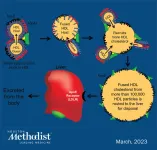Community health workers can help protect pregnant women and their babies from malaria
An implementation science project conducted in four sub-Saharan African countries shows that community-based interventions significantly increased the number of women receiving preventive antimalarial treatment
2023-03-15
(Press-News.org)
Community health workers can make a great difference in increasing the number of pregnant women who receive life-saving preventive antimalarial treatment, according to a study conducted in four sub-Saharan African countries and led by the Barcelona Institute for Global Health (ISGlobal), an institution supported by “la Caixa” Foundation. The findings, published in The Lancet Global Health, will help to guide malaria control strategies in pregnant women and improve maternal and infant health in malaria-endemic countries.
Malaria during pregnancy puts the health of both mother and child at risk. In 2020, an estimated 11.6 million pregnancies in Africa were exposed to malaria infection, resulting in 11% of neonatal deaths and 20% stillbirths. For this reason, the WHO recommends that pregnant women receive three doses of the antimalarial drug sulfadoxine-pyrimethamine (SP) during their antenatal visits if they live in areas with high to moderate malaria transmission. However, the proportion of eligible women receiving this intermittent preventive treatment (IPTp) remains unacceptably low in many countries.
An innovative, community-based approach
The Unitaid-funded TIPTOP project (Transforming Intermittent Preventive Treatment for Optimal Pregnancy), co-led by Jhpiego and Clara Menéndez, Director of ISGlobal’s Maternal, Child and Reproductive Health Initiative, took an innovative “no missed opportunity” approach to increase IPTp coverage: using community health workers, who have been shown to improve the uptake of health interventions such as childhood immunizations. This implementation science project took place in took place in Democratic Republic of Congo, Madagascar, Mozambique and Nigeria between 2017-2022. Collaboration with WHO and Medicines Malaria Venture were a mainstay throughout the project life.
“This study is the largest implementation project carried out in collaboration with the countries’ ministries of health, in which we simultaneously evaluated the impact of community health workers on IPTp coverage and antenatal care attendance,” explains Raquel González, TIPTOP senior epidemiologist and lead author of the study. In the project, community health workers identified pregnant women in the community, provided the required SP doses to eligible women and referred them to the health facility for antenatal care. More than 18,000 women participated in 32 household surveys over three years to assess IPTp coverage before, during, and after the community-based delivery approach.
The results show that IPTp coverage increased significantly after the community-based implementation in all study countries, ranging from 133.6% in Madagascar to 473% in Nigeria, where coverage increased from 12.7% to 31.8%. Importantly, the approach did not reduce antenatal care attendance. On the contrary, it increased slightly in most study areas.
“These results are robust and will help to inform malaria control strategies,” says Clara Menéndez. Approximately 10,000 pregnant women and 200,000 of their newborns die each year from malaria, which means that increasing IPTp uptake through community health workers can save thousands of maternal and infant lives in African countries.
“We’re delighted to see these community-led approaches making a difference in the lives of thousands of pregnant women. Beyond achieving targets, TIPTOP has underscored the critical role community health workers play in supporting the health of women, where they live,” said Elaine Roman, TIPTOP Project Director. “This offers promise and opportunity well beyond life of project; providing a sustainable and trustworthy pathway to improve the health of women across a range of challenges.”
Reference
González R, Manun’Ebo MF, Meremikwu M, et al. The impact of community delivery of intermittent preventive treatment of malaria in pregnancy on its coverage: a quasi-experimental evaluation in four sub-Saharan African countries. Lancet Glob Health 2023; 11: e566–74. https://doi.org/10.1016/PIIS2214-109X(23)00051-7
END
ELSE PRESS RELEASES FROM THIS DATE:
2023-03-15
Robots can be useful as mental wellbeing coaches in the workplace – but perception of their effectiveness depends in large part on what the robot looks like.
Researchers from the University of Cambridge carried out a study in a tech consultancy firm using two different robot wellbeing coaches, where 26 employees participated in weekly robot-led wellbeing sessions for four weeks. Although the robots had identical voices, facial expressions, and scripts for the sessions, the robots’ physical appearance affected how participants interacted with it.
Participants who did their wellbeing exercises with a toy-like robot said that they felt more of a connection ...
2023-03-15
Wildlife documentaries miss an opportunity to highlight the diversity of nature by focusing too much on mammals and birds, according to a new study.
In a new study published in People and Nature, researchers from the University of Cambridge have shown that while the production of wildlife documentaries has exploded over recent decades, they portray a biased view of the natural world around us.
Our natural world is under threat, from habitat and biodiversity loss, to high extinction rates. At the same time, there is a growing disconnect between people and nature, with children’s opportunities to experience the natural world diminishing.
Now more ...
2023-03-15
Electrification is seen as having an important role to play in the fossil-free aviation of tomorrow. But electric aviation is battling a trade-off dilemma: the more energy-efficient an electric aircraft is, the noisier it gets. Now, researchers at Chalmers University of Technology, Sweden, have developed a propeller design optimisation method that paves the way for quiet, efficient electric aviation.
In recent years, electrification has been described as having an important role in reducing emissions from future aviation. Due to the challenges posed by longer ranges, interest is chiefly focused on electric propeller planes covering shorter distances. Propellers connected to ...
2023-03-14
A new demographic survey of authorship in the American Journal of Archaeology (AJA) reveals that people of color have been largely underrepresented among the scholars published in the journal. The results of the survey, which also found that authors who are the children of people without advanced degrees were also underrepresented in the journal’s pages, are published in the paper “Demographic Dynamics of Publishing in the American Journal of Archaeology.” The study was conducted ...
2023-03-14
During the pandemic, medical doctors and researchers noticed that children and adolescents infected with COVID-19 became less ill than adults. A possible explanation for this is that children already had a prior level of immunity to COVID-19 provided by memory T cells generated by common colds.
After studying unique blood samples from children taken before the pandemic, researchers from Karolinska Institutet in Sweden have now identified memory T cells that react to cells infected with SARS-CoV-2, the virus that causes COVID-19.
Four coronaviruses cause common colds
A possible explanation for this immunity in children is that they already had colds caused by one of the four coronaviruses ...
2023-03-14
Houston Methodist scientists reversed infertility in sterile mice by reducing high-circulating cholesterol with a bacterial protein, showing further evidence that links high cholesterol to female infertility. This is a promising development, with one in every five women of childbearing age in the U.S. unable to get pregnant after trying for a year.
“We are working with a protein, called serum opacity factor, with unique characteristics,” said Corina Rosales, Ph.D., assistant research professor of molecular biology in medicine with the Houston Methodist ...
2023-03-14
LEXINGTON, Ky. (March 14, 2023) — The lung transplant team at UK HealthCare’s Transplant Center recently celebrated a major milestone, performing the 500th lung transplant since the lung transplant program was founded in 1991.
“This is an impressive milestone, and our whole staff — physicians, surgeons, nurse practitioners, nurse coordinators, pharmacists, nutritionists, social workers, therapists and support staff — should be very proud of their success,” said Sravanthi Nandavaram, M.D., medical director of the Lung Transplant Program. ...
2023-03-14
Since the development of functional magnetic resonance imaging in the 1990s, the reliance on neuroimaging has skyrocketed as researchers investigate how fMRI data from the brain at rest, and anatomical brain structure itself, can be used to predict individual traits, such as depression, cognitive decline, and brain disorders.
Brain imaging has the potential to reveal the neural underpinnings of many traits, from disorders like depression and chronic widespread pain to why one person has a better memory than another, and why some people’s memories are resilient as they age. But how reliable brain imaging is for detecting traits has been a subject of wide debate.
Prior research ...
2023-03-14
The rare sight of a Wolf-Rayet star – among the most luminous, most massive, and most briefly detectable stars known – was one of the first observations made by NASA’s James Webb Space Telescope in June 2022. Webb shows the star, WR 124, in unprecedented detail with its powerful infrared instruments. The star is 15,000 light-years away in the constellation Sagittarius.
Massive stars race through their lifecycles, and only some of them go through a brief Wolf-Rayet phase before going supernova, making Webb’s detailed observations of this rare phase valuable to astronomers. Wolf-Rayet stars are in the process of casting off their outer layers, ...
2023-03-14
Researchers at Tufts University School of Medicine and colleagues have identified a small molecule that may help treat people with epilepsy whose condition has become resistant to the benzodiazepine drugs usually used in managing seizures. The research, conducted in laboratory cells and rodents, was published online March 7 in Cell Reports Medicine.
Uncontrolled epilepsy can lead to frequent and prolonged seizures lasting five minutes or more that can cause brain cell damage and even death. The condition affects an estimated 3.4 million people in the U.S. and millions more worldwide.
Epilepsy occurs ...
LAST 30 PRESS RELEASES:
[Press-News.org] Community health workers can help protect pregnant women and their babies from malaria
An implementation science project conducted in four sub-Saharan African countries shows that community-based interventions significantly increased the number of women receiving preventive antimalarial treatment




